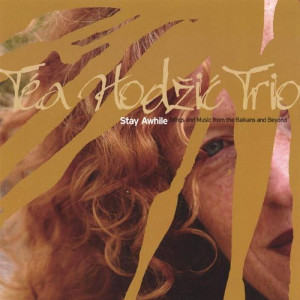 The Téa Hodžić Trio is the first project for these three musicians as a trio, although they’ve been performing together as members of other ensembles for several years. Lead singer and guitarist Téa Hodžić is a native of Sarajevo in Bosnia, although it was Yugoslavia when she was born. She has been performing with her sister Mirella since she was 10 years old, and is trained in classical guitar and opera. After the fall of Yugoslavia, she moved to the U.K., where she has been active in the theater, TV and radio, and the folk, rock and world music scenes.
The Téa Hodžić Trio is the first project for these three musicians as a trio, although they’ve been performing together as members of other ensembles for several years. Lead singer and guitarist Téa Hodžić is a native of Sarajevo in Bosnia, although it was Yugoslavia when she was born. She has been performing with her sister Mirella since she was 10 years old, and is trained in classical guitar and opera. After the fall of Yugoslavia, she moved to the U.K., where she has been active in the theater, TV and radio, and the folk, rock and world music scenes.
In 1995 the sisters joined The Budapest Cafe Orchestra, which is now known as Szapora. Both the other trio members, Oliver Wilson-Dickson (violin, darbuka, vocals) and Luke Carver Goss (accordion, guitar, vocals) were also members of Szapora. Wilson-Dickson, a performer and composer, is very active in all kinds of music in the U.K., including the BBC National Orchestra of Wales. Goss, a composer, musician and educator, is also involved in all kinds of projects across the U.K., and currently works for the London Symphony Orchestra.
Stay Awhile is a beautiful album of mostly traditional songs from the Balkans. These three musicians perform with a superb sense of connection, working closely to bring out every drop of emotion in these often hyper-emotional songs, while never overplaying or over-emoting. Many of them, such as the opening Roma ballad “Córoro,” and the Serbian love songs “Zasto Sike, zasto,” and “Zal za mladost,” are slow, mournful laments, which Hodžić delivers perfectly in her smoky but smooth, robust alto voice. And there are also several faster dances, such as “Verka Kaluderka,” a Roma love song; and my favorite, “Racenica,” a Bulgarian dance in 7/8 time, with superb three-part harmonies and an appearance by the producer, Dylan Fowler, on mandocello. In between are songs like the gentle folksy “Oj vesela veselice” from Montenegro, and “Zar ja neman ruse kose,” full of pent-up emotion that smolders just under the surface.
Other favorites of mine are the Serbian dance “Fatise kolo, gradske devojke,” which starts with a capella three-part harmonies, and the Macedonian love song “Eleno kerko, Eleno,” with sighing harmony vocals by Goss and Wilson-Dickson. The sole song in English is the title track; given Hodžić’s accent, it took a while to realize it was in my own tongue!
This is a fine, fine album of Balkan song, by committed and talented musicians. Any fan of the music would be glad to Stay Awhile with this recording.
(Taith, 2007)
